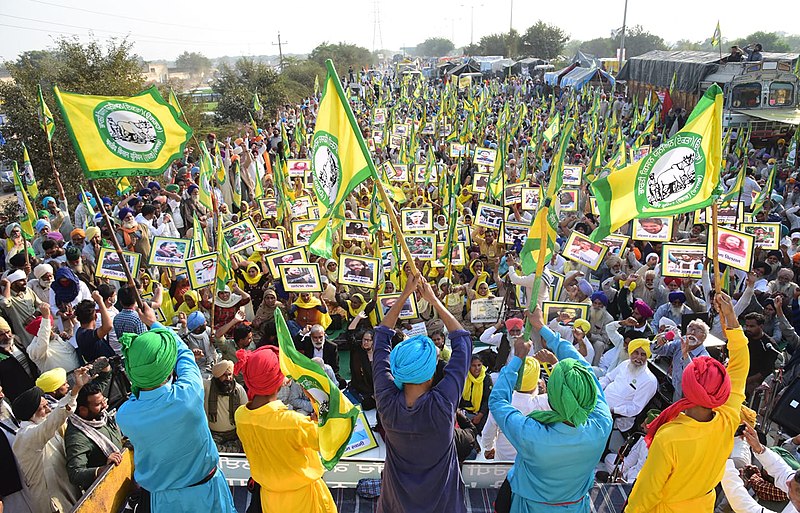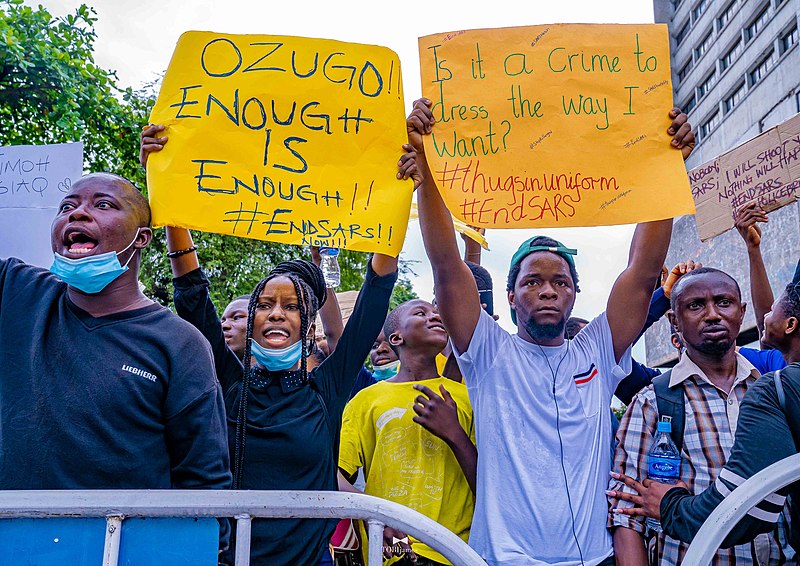2020 was a year defined by people, groups, and communities standing up for their rights, fighting for equal treatment, and their right to exist. The Black Lives Matter movement across the US and protests in the UK calling attention to the government’s failure to investigate the deaths of Black citizens highlighted historical and current racial disparities. The End SARS demonstrations in Nigeria and farmer protests in India brought international attention to those protesting government policies that gravely affected their livelihoods. The world over, these people, groups, and communities have utilized Universal Declaration of Human Rights Article 20, “right to freedom of peaceful assembly and association,” to do this.

However, at almost every turn, these protests and calls for justice, accountability, and respect for fundamental human rights have been unduly met with harsh resistance and actively combatted through violent and illegal means by law enforcement.
Take, for example, the manner in which the Minneapolis Police Department fired rubber bullets and tear gas upon citizens protesting the heinous murder of George Floyd. In India, scenes of peaceful protesters beaten, hosed with water cannons, and choked in tear gas brought global attention to new laws affecting the farming industry. Moreover, we can also look at the tragic events of “The Lekki Massacre” on October 20th, 2020, as the Nigerian Army fired at and killed their own citizens peacefully protesting at the Lekki toll gate.
The violent response to these protests is highly concerning for several reasons. Of course, it is truly troubling and sickening to see individuals lose their lives for merely seeking to exercise their internationally guaranteed human rights. At the same time, it is deeply disturbing and alarming to see just how easily law enforcement and nation-states are willing to flout international law and standards in their efforts to suppress peaceful protestors and their message(s).
The right to protest has been under a concerted attack from nation-states within recent years, with France, Germany, and the United Kingdom attempting to impose blanket bans on protesters, which were then overruled by courts. However, the violent resistance which has befallen protesters across the globe in 2020 has taken this attack to a new extreme as states use public health concerns in the midst of the COVID-19 pandemic to further restrict protests.
At almost every step, we have seen states comfortably disregard internationally accepted standards and practices, actively putting their citizens at risk of serious harm and danger. We have seen police deploy tear gas, classified as a chemical warfare agent and banned under the 1925 Geneva Protocol for use in war. Yet, we saw law enforcement agencies across the United States use tear gas against civilians throughout the summer 2020 BLM protests.
Police also used Kinetic Energy rounds (rubber bullets), demonstrating the weapon’s devastating effects on protestors. Unlike traditional bullets, which pierce the skin, rubber bullets are designed to strike someone with blunt force. However, a 2017 study found that three percent of people hit by rubber bullets died from the injury sustained, and a further 15% were permanently injured.
The summer 2020 protests in Minneapolis tell a similar story as Humphrey School Graduate, Soren Stevenson, was left with serious eye damage after being struck by a rubber bullet. In the Lekki Massacre, the Nigerian state unleashed the force of its military against peacefully protesting citizens, further demonstrating the extreme harm caused by these weapons as they injured dozens, leading to a tragic and heinous loss of life. So devastating are the potential effects of rubber bullets that Dr. Rohini Haar states: “using them against unarmed civilians is a huge violation of human rights.”

What truly compounds this gross violation of international human rights is the continued overall lack of accountability for these violations. Barring a few hearings held at the international level, there has been little done by way of accountability for states openly committing crimes against humanity and other such human rights violations. Calls to suspend future sales of tear gas equipment to the US in the UK fell upon deaf ears. Authorities in Nigeria attempted to cover up the true death toll of the Lekki Massacre. The international community has displayed a collective ambivalence towards the plight of India’s farming community, save for minor commentary from Canadian Prime Minister Justin Trudeau.
On the one hand, it is encouraging to see the beginnings of conversations seeking to hold governments and police forces accountable for their actions against peaceful protesters. We welcome the finding that the City of Portland was in contempt for violating orders limiting the use of tear gas. It is also positive to see state and local lawmakers begin the push for the police to use “less lethal” weapons. However, these are only tiny steps to address a much larger problem.
The continued assault on the right to protest by nation-states is an extremely dangerous and troubling trend. We as citizens run the risk of having one of our fundamental human rights drastically altered and eroded. The fact that so many of the world’s leading nations have been allowed to take such drastic, disproportionate, and unlawful measures to curtail the right to protest is a frightening reality.
Moreover, the lack of accountability with which these nations have been able to usurp international law represents an egregious failure to uphold basic human rights. The right to assemble and peacefully protest is one of the most centrally important human rights guaranteed to each of us. It is a right that needs not only to be protected but championed to the highest degree possible. The manner in which this right has been attacked in recent years is a trend which each of us needs to work diligently to debunk. NGOs, nation-states, and multilateral agencies such as the UN must do more to not only protect the rights of protesters, but also hold accountable the nations and actors who would seek to curtail the exercise of this right.
Sarah Allis is an alumnus of the Master of Human Rights program, concentrating on research methods.
Joy Hammer is an alumnus of the Master of Human Rights program with a concentration in international conflict and security.
Paul Olubayo is an alumnus of the Master of Human Rights program with a concentration in International Justice and Human Rights Law. Paul presently works at an international Anti-Slavery organization.
Hannah Shireman is an alumnus of the Master of Human Rights program with a concentration in research methods.
Bailey Sutter is a second-year Master of Human Rights student with a concentration in racial justice, education, and the school to prison pipeline.
Vanesa Mercado Diaz is a second-year Master of Human Rights student with a concentration in women’s rights, migration, and Latin America.
Raven Ziegler is an alumnus of the Master of Human Rights program with a concentration in business and human rights.

Comments